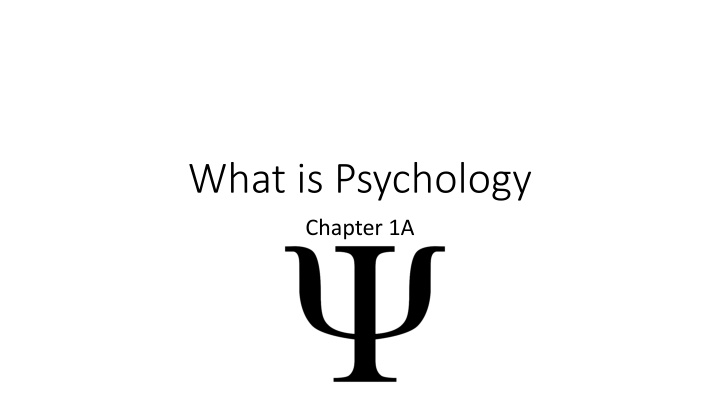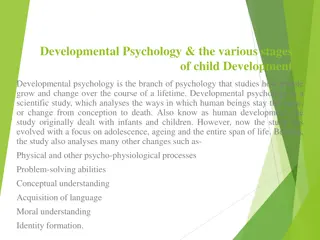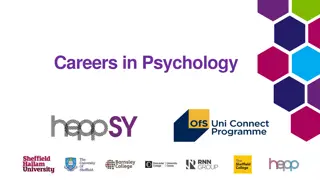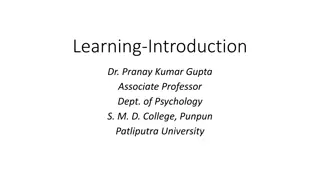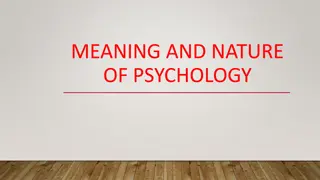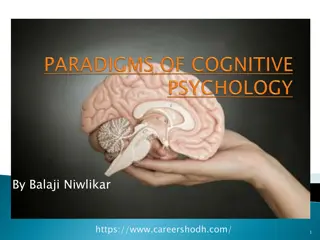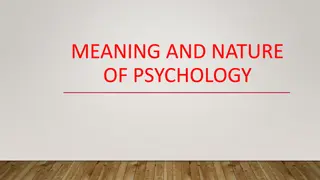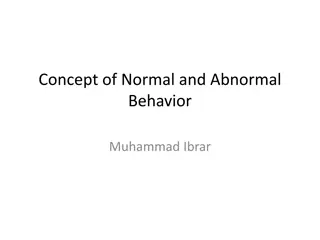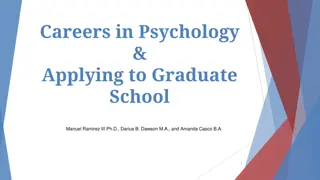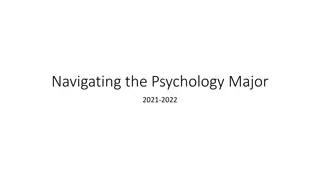Introduction to Psychology: Understanding Behavior and Mental Processes
This material covers key aspects of psychology including the definition of psychology, its scientific nature, comparison with fake sciences, the birth of modern psychology, and different perspectives in psychology such as learning, biological, cognitive, and sociocultural. It delves into the roots of psychology, debunking pseudo-sciences like phrenology, and highlights the importance of understanding human behavior and mental processes through empirical evidence and research.
Download Presentation

Please find below an Image/Link to download the presentation.
The content on the website is provided AS IS for your information and personal use only. It may not be sold, licensed, or shared on other websites without obtaining consent from the author.If you encounter any issues during the download, it is possible that the publisher has removed the file from their server.
You are allowed to download the files provided on this website for personal or commercial use, subject to the condition that they are used lawfully. All files are the property of their respective owners.
The content on the website is provided AS IS for your information and personal use only. It may not be sold, licensed, or shared on other websites without obtaining consent from the author.
E N D
Presentation Transcript
What is Psychology Chapter 1A
The Science of Psychology Section 1
What is Psychology? Study concerned w/ peoples BEHAVIOR and mental processes How are they affected by physical state (body), mental state (mind), and external environment Essentially, what makes people TICK Environment vs. genetics
Psychology vs. Fake Sciences Is based on EMPIRICAL evidence and research (experiments) Unlike fortune telling, psychic, astrology, and graphology (handwriting) Ex. Neither of the above predicted 9/11 or WWII
Birth of Modern Psychology Early psychologists wanted to __________ behavior. 1. Describe: What is the happening? 2. Predict: What will happen? 3. Understand: Why is it happening? 4. Modify: Change what will happen.
Phrenology Came before Psychology Believed different bumps on the head accounted for behavior Ex. Anger, depression and even stealing Considered a PSEUDOSCIENCE (nonsense)
Psychology Today (5 Perspectives) 2. Learning Focus on the ENVIRONMENT: 1. Biological Focus on the PHYSICAL: Hormones Behavior is based on rewards and punishments Chemicals in the body Electrical impulses Ex. School; reward for studying / punishment for not (your grade) Handicap or disease
Learning perspective example: 1. I could sleep in an extra 30 minutes in the morning Reward: extra sleep Punishments: no breakfast 2. On my planning period I can go for a walk instead of do work Reward: exercise Punishment: I have to do work later at home
3. Cognitive What goes on in YOUR HEAD 4. Sociocultural Impact OTHER PEOPLE have on us How we reason Language Remember Beliefs Understand What we eat / how we dress
5. Psychodynamic Unconscious forces from within How do we deal with conflict? Ex. We see a burning van with people inside, what would be some ways people would respond?
Section 1 Review: 1. What is the study concerned with peoples behaviors? 2 List 3 fake sciences. 3. What is the LEARNING PERSPECTIVE based on? Give you own example. 4. How are the COGNITIVE and SOCIOCULTURAL perspectives different?
What Psychologists Do Section 2
Basic Psychology Seeking knowledge to UNDERSTAND something rather than using it Ex. Why does something work? Many basic psychologists have advanced (doctoral degrees) Might try to do research on how peer pressure influences a persons decision making process
Applied Psychology Studying something to USE it in the real world Studying food habits to improve people s health Will take the research they have found (or others have found) and try and APPLY it to the real world Might ask how can the knowledge learned about peer pressure be used to decrease bad decision making
5 Types of Psychotherapists 1. Psychotherapists Any type of THERAPIST Term is NOT regulated May have NO degree or an ADVANCED degree Ex. Herbal
2. Clinical Psychologists Diagnoses and treats emotional problems Mild (anger) to severe (Schizophrenia) Has a Ph.D. or Psy.D. Unlikely to use medicine / may treat anxiety with meditation
Class Changes for Tomorrow 1. Class will begin at 1:05 PM and go until 2:20 2. Auto bypass of lobby will be activated so I don t have to let people in after their WiFi bounces them out
Psychoanalysis System of therapy which tries to treat MENTAL DISORDERS by bringing REPRESSED feelings and fears into the conscious mind To REPRESS is to subconsciously forget a traumatic memory as a natural defense mechanism to handle or resolved a conflict
3. Psychoanalyst Practices only ONE form of therapy Must have an advanced degree in (Ph.D.) in psychoanalysis May treat ANY kind of EMOTIONAL disorder Must have undergone psychoanalysis themselves
4. Psychiatrist Has a MEDICAL degree (M.D.) May also treaty both mild and severe emotional problems Most likely to use medicine to treat problems bc of medical background Ex. Severe anxiety would be treated with XANAX
Counselor (marriage, family and child) Treats common individual and family problems May also deal with ABUSE and ADDICTION Usually gives advice Generally has at least a Masters Degree in Psychology (M.A) Ex. 2 siblings are fighting bc one is better at sports
Section 2 Review: 1. What type of degree must a CLINICAL psychologist have? 2. Describe a PSYCHOANALYST. 3. How is a PSYCHIATRIST likely to treat a patient? Why? 4. Give an example of what type of issue a COUNSELOR might encounter? How would they solve it?
Critical and Scientific Thinking in Psychology Section 3
Ask Questions! Children will ask, Why is the sky blue We tend to stop asking questions as we get older We also become less creative Don t be afraid to question anything!
Define Your Terms Be as specific as possible Ex. Can animals use LANGUAGE? Technically, YES if language is defined as any COMMUNICATION We will use the scientific method with HYPOTHESIS and OPERATIONAL DEFINITIONS
Examine the Evidence In research an idea MUST be back by evidence Ex. LeBron James is the greatest basketball player because he is Lazy argument bc there is no FACTS stated to prove or back the point
Objective Something that is FACTUAL Subjective Something that is OPINION Mr. Gregory is left handed Left handed is better than right handed There are 50 states in the U.S Puerto Rico should be the 51ststate
Assumptions and Biases Assumptions Beliefs that are taken for granted Biases Assumptions that keep us from examining the evidence clearly Ex. History teachers are the smartest teachers in the school Ex. My friend s wife looks Asian so I assumed she spoke Chinese (I m Biased bc I am one)
Avoid Emotional Reasoning Emotion can be a powerful MOTIVATOR You may have strong feelings already about; immigration, origin of life, racism, sexism etc. Disagreement is fine but ask yourself is it because EVIDENCE or BIAS? This may be the hardest question we ask ourselves
Dont Oversimplify (overgeneralize) Using one persons story to define everything My friend is on welfare and never looks for a job and is lazy Therefore, EVERYONE on welfare is lazy Known as ARGUMENT BY ANECDOTE (one persons story)
Tolerate Uncertainty Researchers must avoid drawing conclusions until other researchers have REPLICATED their findings This means the same conclusion must happen over and over again Ex. Gravity; if I drop a pencil it will fall downwards EVERY time. Most things are not this certain
Section 3 Review: 1. In RESEARCH what must ideas be backed by? 2. What is a BIAS? Give an example. 3. Give an example of a SUBJECTIVE and OBJECTIVE idea. 4. What does it mean to OVERSIMPLIFY? Give an example. 5. What must happen for researchers to draw CONCLUSIONS?
Descriptive Studies: Establishing the Facts Section 4
Case Study Detailed description of a particular individual being studied Can include information about a person s childhood, dreams, relationships or experiences Most commonly done by CLINICIANS Read case study p.18 for example (don t copy)
Observational Studies Researcher OBSERVES a person (or animals) behavior without intruding Purpose is to find out how people act in their NORMAL environment Can take place in a LABORATORY (more control) or in NATURE (home, school, etc.) Issue with LAB is that people usually act differently when we know we are being watched
Tests Should Be Both: Reliable Produces the SAME results over and over Valid Must measure what it is DESIGNED to measure Ex. If I give you 2 versions of a quiz and you score a 100 and a 50 Ex. If I teach the Civil War, the test should be on the Civil War
Testing Norms Established standards of PERFROMANCE from the past Test a large group of people Norms will show which scores are considered high, low, or average Will change test to test
Surveys Questionnaires that directly ask people about an issue or topic Goal is to get a REPRESENTATIVE SAMPLE A group of people who ACCURATELY reflect the larger population Should generally contain different: Gender, race, age, and socioeconomic status (wealth level)
Problems with Surveys Many choose to stay silent and decline surveys if their opinion is unpopular People sometimes LIE Only survey ONE group of people (not representative of population) Ex. I survey only wealthy people about how the economy is going
Section 4 Review: 1. Who MOST commonly does case studies? 2. What makes a test VALID and RELIABLE? Give your OWN example of each. 3. What are testing NORMS meant to show? 4. List a few PROBLEMS with surveys.
Create a Survey By yourself or in a group (3 max) create a 5 question survey Make sure the LANGUAGE is clear Survey at LEAST 6 people from the room Calculate your results
Example: Who was the 3rdpresident of the U.S? (Trivia) Who would you have voted for in the last election? (Multiple Choice) What age do you think people should drive at? (Open Opinion) Do you believe in God? (Yes or NO) Do you prefer coke or Pepsi? (Comparison)
